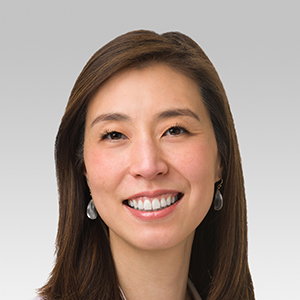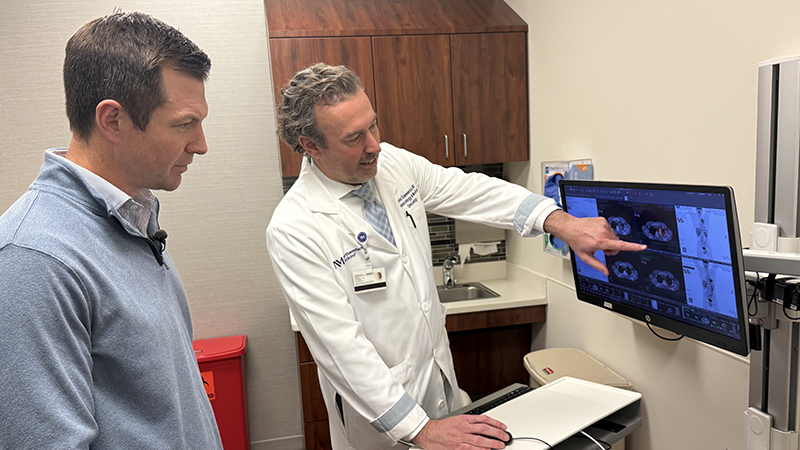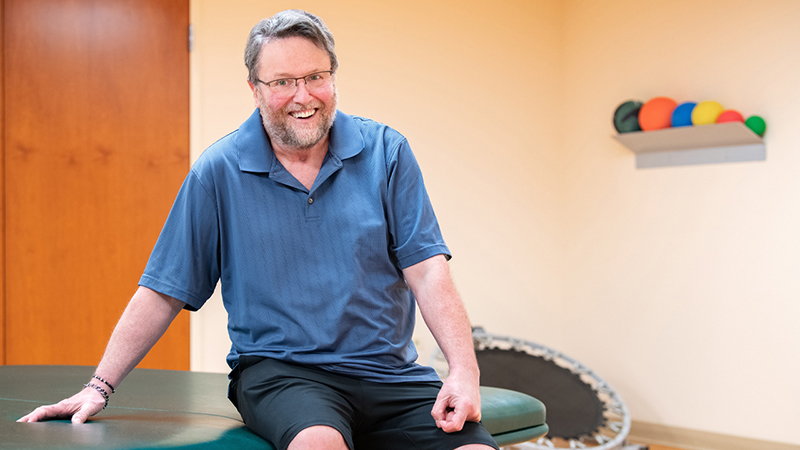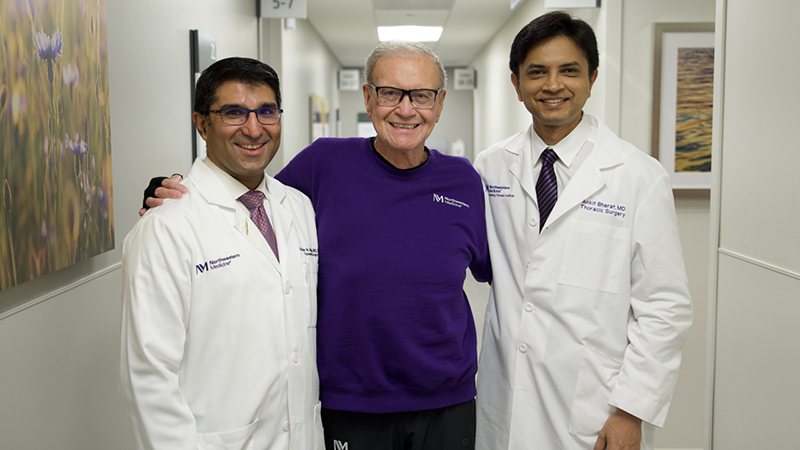Honoring Those With Asian American and Pacific Islander Heritage
Updated May 2023
Thoughts and Stories From Three Northwestern Medicine Employees of AAPI Descent
Meet three Northwestern Medicine employees who are of Asian American and Pacific Islander (AAPI) descent and are making Northwestern Medicine better.
Jennifer N. Choi, MD, Dermatologist, Northwestern Medical Group
Dr. Choi specializes in supportive oncodermatology and thrives on improving the quality of her patients' lives and giving them hope. Her path and experiences with stereotypes shape how she approaches patient care.
What is your proudest accomplishment?
Teaching, mentoring, conducting research, patient care, and everything else that goes along with being a physician in academic medicine, all while raising my family. I'm married with three daughters, and my husband is also a Northwestern Medicine dermatologist. I am fulfilling what I believe is my purpose in life.
What is one obstacle you have had to overcome?
There have been stereotypes to overcome as an Asian woman in academic medicine. Stereotypically, Asian women may sometimes be seen as compliant with a tendency to avoid confrontation. I have learned that there are times when you need to exert your opinion, especially if something feels "off." As I have matured, I have found my voice and the courage to make waves when needed.
These obstacles have taught me to never make assumptions when I work with my patients. You have to come to know and understand where a person is coming from and give them the opportunity to ask questions.
What does your AAPI heritage mean to you?
Living in gratitude for what my parents have done. My parents came from South Korea in 1971 as newlyweds for my dad's medical residency. Their families were still in South Korea, and they dealt with the language barrier and stereotypes while raising three kids. I am still in awe at how they figured out how to set my siblings and me up for success.
Early on, my parents encouraged us to learn about our culture, and I pass that along to my kids. We share family stories, go to a predominantly Korean-American church, and learn about Korean and Korean-American history. We're also working on teaching them the language.
How are you making a difference?
Every day, I believe I am making a difference by making an impact on my patients' lives and giving them hope, even if I can help with just one aspect of their care. With research, my mission is to discover something on a broader level that can affect thousands of patients. With my teaching and mentoring, I also inspire my medical students to make a difference in whatever capacity they can now and in the future.
What is your favorite childhood memory?
My childhood family vacations. We had little to no extended family in the U.S., so we have always been a tight-knit family. We would go fishing, touring around and more. My parents were really good at knowing how to be present and making our family unit feel really special. After my mom passed away from pancreatic cancer four years ago, I have cherished the memories and old family videos of those vacations even more.
Yen Le, OTR/L, Occupational Therapist, Marianjoy Rehabilitation Hospital
After wanting to fit in when she was young, Le now embraces differences in herself and others. Her open and accepting mindset informs her work as an occupational therapist.
What is your proudest accomplishment?
I was the first in my family to graduate from college. I went to the University of Illinois for my undergraduate degree, and then I received my master's in occupational therapy from Midwestern University.
Who is your mentor?
My parents. We are immigrants from Vietnam. My dad was a lieutenant in the Vietnam War and held as a prisoner of war. Because of his experience, he was later accepted to bring us to America. My parents left their country, culture, family, friends and jobs to move us to a foreign country.
We arrived in 1996 with one suitcase for our family of four and lived in a two bedroom, one bathroom apartment in Wheaton, Illinois with another family of five. My parents worked really hard to raise my brother and me all while sending money to relatives in Vietnam. I admire their work ethic and selflessness.
It is not easy to start a new life with nothing in your bank account as a middle-aged adult, and learn a new language, skill sets, and duties in an unfamiliar environment while raising your children. My desire to succeed stems from growing up and seeing my parents' passion and determination to give their kids a good life in America.
What is one obstacle you have had to overcome?
The language barrier was the biggest obstacle when we moved to America. I wanted to communicate in preschool, kindergarten and part of first grade but couldn't because I was learning English. Imagine not knowing how to tell your teacher you have to go to the bathroom! Identifying with a different culture in a predominately white community had its difficulties. I hid the ethnic meal lunches my mom packed because I wanted to "fit in." I was always trying to assimilate into American culture. I appreciate what makes me different now, but I remember my desire to blend in at the same time while wanting to be accepted for my differences growing up.
What is your favorite childhood memory?
I hold onto memories of playing with my neighbors and friends from school and church. I was a tetherball and hopscotch champ. I also loved roller-skating. My parents let me roller skate in the apartment, and it definitely ruined our floors! I don't think they got their deposit back after we moved. They were saints for supporting my love of roller-skating!
What does your AAPI heritage mean to you?
It defines who I am. I am proud to be an immigrant, and feel grateful and fortunate to experience two sets of cultures. Sometimes I feel like I am in limbo and it's hard to identify myself, but rather than dividing my identity in half, these two sets of experiences add to my understanding, appreciation and enjoyment of the world around me.
I also feel that growing up and experiencing a different culture in my home makes me more accepting of diversity and other cultures. I have a mindset to expand beyond my circle, and being accustomed to differences has naturally helped me in the clinical setting as well. It has made me more accepting of things outside of my norm. I remember wanting to be accepted for my differences growing up. Now, I love sharing my culture with my fiancé and friends.
Michael Millare, Performance Improvement Leader, Northwestern Medicine
Millare has deep roots and a passion for his community that drives his work at Northwestern Medicine.
Can you speak to your long history with Northwestern Medicine?
My mom has been with Northwestern Medicine for 31 years as a patient care technician, starting at Northwestern Medicine Woodstock Hospital and now Northwestern Medicine Huntley Hospital. I was born at the old Woodstock Hospital on South Street and raised in Woodstock. I care about this community deeply.
My employment with Northwestern Medicine started 16 years ago when I worked in Food Services throughout high school and over my breaks in college. I was a healthcare administration major in college and eventually got an internship with Rachael Sebastian, the current vice president of Operations for Regional Medical Group. My first job after college was with Revenue Cycle, then I moved to Information Services until I took my current role with Performance Improvement in 2016.
What is your proudest accomplishment?
My first big project at Northwestern Medicine was implementing best practices learned across the health system regarding throughput, which is the flow of patients to ensure timely and appropriate care. It was not an easy lift, but it was worth it to make a positive impact on our patients, hospital operations and staff members.
What does your AAPI heritage mean to you?
The Filipino people are very hard working and generous. For me, it's honoring traditions and characteristics that make Filipinos special. I take pride in seeing other Filipinos at Northwestern Medicine knowing they embody these same characteristics.
How are you making a difference?
I build relationships with a trusting approach to bring everyone together to produce a better product or process. My favorite part of my job is collaborating with people from all over the health system. To kick off projects with new teams, I have many, many icebreakers. One I like is asking everyone's go-to karaoke song, and at the end of the meeting, I'll send out a playlist with all the songs from the team.
If you weren't a performance improvement leader, what would you be?
An epidemiologist. I like the idea of finding the root cause of a disease to improve public health.
What is your favorite childhood memory?
The school bus would drop me and my brother Mark, who is now a financial counselor at Northwestern Medicine, off at Woodstock Hospital where we'd hang out until my mom's shift ended. We'd sit in the break room, eat Lorna Doone cookies and graham crackers, talk with the physicians, and then go home with our mom.
Calvin Ip, DPT, Physical Therapist, Northwestern Memorial Hospital
Ip strives to make a difference by being better. He embraces his ethnicity and finds joy within his community.
What does your AAPI heritage mean to you?
It means a lot, and it defines who I am — it's my heritage. My parents immigrated from Hong Kong, and I take pride in the fact that I am 100% Chinese, but I was born and raised in Chicago, so I also consider myself 100% American. I am someone who bridges two cultures, two groups of people, and that's becoming prevalent in our country — there is more culture and diversity.
As a first-generation American, I bridge the gap of what it means to be here, which also has an impact on the kind of communities that I seek to join. I joined the AAPI Chapter of the Northwestern Medicine Champion Network, an employee resource group, and they've been a great community.
I am also a part of a men's club volleyball team called Chicago United which plays a version called Chinese 9-Man Volleyball. Its origin goes into the history of Asian Americans in America and how we held on to the sport since the first immigrants came over.
How are you making a difference?
As a physical therapist, I can listen and relate to my patients, especially with my multiple previous experiences as a patient. As an individual, I follow my faith and try to be the best person I can be to my patients, coworkers, family and friends, that's what matters most.
Can you speak to your history with Northwestern Medicine?
I have been at Northwestern Medicine since June 2021, when the Northwestern Medicine Center for Spine Health at Northwestern Memorial Hospital opened. I was one of the first two physical therapists hired, and it's been phenomenal. My managers and co-workers have been very supportive.
I enjoy the culture at Northwestern Medicine, it is a place where we can grow and increase our knowledge in all aspects. I can't ask for a better workplace.
If you weren't a physical therapist, what would you be?
I would love to be a pickleball pro athlete just because I love that sport. However, before I was a physical therapist, there was a season of my life when I wanted to be a commercial pilot to enjoy traveling the world.
What is your favorite childhood memory?
I miss having weekly Sunday morning dim sum with my grandma in Chinatown when she was alive. Think of a huge round table, food stacked on every open space, a delicious aroma, sounds everywhere, and everyone is happy.
Mini Moll, Surgery Scheduler, Northwestern Memorial Hospital
As a current employee and former patient of Northwestern Medicine, Moll enjoys sharing her story to make a difference in the lives of others.
Can you speak to your long history with Northwestern Medicine?
In June 2023, it will be 16 years since I started at Northwestern Memorial Hospital. In those 16 years, I have worked in the Radiology, Emergency, Pre-operative and Urology departments. I love Northwestern Medicine; I have learned so much and met many wonderful people here.
Northwestern Medicine saved my life — twice. I had a brain tumor and thyroid cancer, so I understand how patients feel. I like to share my story and talk to patients with a smile. It helps people be less anxious.
What is one obstacle you have had to overcome?
The biggest obstacle I had to overcome was moving from India to the United States when I was 6 years old. It was a culture shock for me, especially since there were no other Indian families around us. I was lucky to have made new friends of different cultures and religions, some of whom had parents who were also immigrants, so they took me in and made me feel welcome.
How are you making a difference?
I love educating people about Kerala, the South Indian state where I was born. It is very different from what people know of India. It’s very tropical, friends and neighbors often have different religions, and the food is spicier than it is in North India.
What is your proudest accomplishment?
My proudest accomplishment is meeting and marrying my husband of 5 years. We were both in our 50s when we met, and both thought we would never get married — until we found each other!






